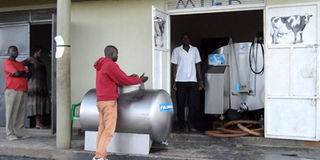Dairy farmers fault URA officials

Pressed. Milk dealers bring their milk to a collection centre belonging to Kabula Farmers Cooperative in Lyantonde Town on Saturday. Diary farmers have been imposed on tax by the URA. Photo by Cleophas Tukamarwa
What you need to know:
- Milk. Mr Bagabo said milk sold through cooperative fetches between Shs800 to Shs1, 200 per litre and the cooperative retains Shs100 to run its activities.
- Milk from the cooperative is sold in its raw form to dairy milk chain companies such as Sameer Agriculture and Livestock Ltd, Pearl Dairies Ltd and Amos Dairies Uganda Ltd.
- In Lyantonde, Mr Bagabo said the cooperative society collects more than 50,000 litres of milk during dry spells and more than 70,000 litres during rainy season - making it the leading dairy cooperative society in the district with 600 dairy farmers.
- Other cooperative societies are Twimukye Dairy Farmers in Kashagama Sub- county, Kyenshama Dairy Farmers.
Lyantonde. Dairy farmers from four districts of Lyantonde, Sembabule, Kiruhura and Rakai have faulted Uganda Revenue Authority (URA) for continuing to levy withholding tax on milk, which they say has stifled the growth of the dairy industry.
The farmers through their cooperatives accuse URA of levying the tax illegally since President Museveni stopped it three years ago.
Mr Yosia Bagabo, the chairperson of Kabula Farmer’s Cooperative Society, said farmers have no records for cost of production to verify the tax imposed on them and majority earn less profits from milk yet the cost of production is high.
He said dairy farmers in Lyantonde started paying the tax in January and his cooperative alone remits Shs15m to URA every month.
“Despite the presidential directive stopping the tax, they have continued to come to our offices to levy the 1 per cent withholding tax per litre of milk. They are forgetting that the President’s word is final and whoever refuses to implement it, is undermining his authority,” he said during an interview at the weekend.
Background
In 2016, while addressing dairy farmers at his country home in Rwakitura, Kiruhura District, President Museveni rejected the milk tax, saying it will cripple the growth of the dairy industry.
Mr Alex Nuwamanya, a dairy farmer from Kashagama Dairy Cooperative Society, asked government to provide them with machines that cut silage to ease their work and also speed up irrigation farming which will boost milk production.
“If they do that, milk production will improve and we will be able to pay the tax they want without any hesitation,” he said.
Mr Yosam Rutembesa, the chairperson of Rwampogo Cooperative in Kiruhura District, said: “Let government first build the industry before taxing us. We have met the President and he told us that he is not aware about this tax, can we say that some people are collecting the money for their own benefit?”
Mr Fred Muhangi, the Lyantonde District chairperson, said the district budget is largely supported by dairy farmers because the district collects taxes from all those involved in dairy production.
“So, telling them [dairy farmers] to pay another tax is in real sense double taxation, which is illegal,” Mr Muhangi said.
Both the head of public and corporate affairs at URA, Mr Vincent Sseruma and his deputy Mr Jamil Ssenyonjo, could not answer our repeated calls at the weekend .
However, Ms Assy Nantongo Ssali, the URA South- western regional manager, had earlier told Daily Monitor that they were not aware that the tax was stopped by the President.
According to the National Population and Housing Census, 2014, out of the total population of 93,753 people in Lyantonde District ,11,806 (57.2per cent) are engaged in livestock farming, while 16,383 (79.4 percent) are growing crops.
The State minister for Animal Husbandry, Ms Joy Kabatsi, wondered why URA has defied the orders of the President and continued to collect taxes.
She, however, promised to raise the matter in Cabinet and on the floor of Parliament.
“I personally I have a copy of the letter from the President ordering URA to stop collecting tax from daily farmers,” she said.



